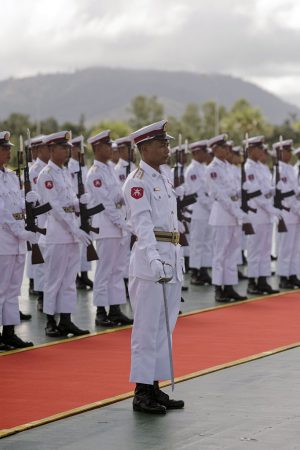In every major city in Myanmar, protestors have denounced the February 1 coup, calling for an end to military rule and the restoration of democracy. Resistance has taken many forms and has been supported by local lawyers who have shown that the coup was unconstitutional.
A key question related to the legality of military rule concerns Australia.
At the time of the coup, the vice president, retired general Myint Swe, claimed he was acting as president and declared a constitutional emergency. The question, however, is whether Myint Swe is legally eligible to hold the presidency under the terms of the 2008 Constitution.
The question of whether or not the coup is legal might appear superfluous to a regime that has just seized control by force and violently cracked down on the protests. But for the rest of the world looking for leverage to pressure the military, the law may offer a sliver of hope.
According to section 59f of the Constitution, there are limits to who can hold the office of president or vice-president in Myanmar. A person cannot hold such office if they have foreign citizenship, or if their spouse, children, or children’s spouses are citizens of a foreign country.
Section 59f has become infamous because it prevented Aung San Suu Kyi from becoming president after her party’s landslide election victory in 2015. Her deceased husband held U.K. citizenship, and her sons also hold foreign citizenship.
Myint Swe may have been acting illegally if he was in fact ineligible to hold office in the first place, for this very same reason.
In 2012, after one of the vice presidents stepped down, the generals initially nominated Myint Swe as vice president. Myint Swe is known as a hardliner and is rumored to be related by marriage to Than Shwe, Myanmar’s former ruler. Myint Swe was also previously placed on the U.S. sanctions list.
However, it was reported at the time that Myint Swe has a son-in-law with Australian citizenship, although this was never confirmed. Whether the citizenship question proved to be an obstacle, or some other issue arose, in the end Myint Swe was not appointed vice president.
In 2016, however, Myint Swe did become one of the vice presidents. By then, Reuters reported, citing anonymous “official sources” without making clear if these sources were from Myanmar or Australia, that Myint Swe’s son-in-law may have surrendered his Australian citizenship. Other reports around the time stated he was “believed to have since been reinstated as a Myanmar citizen,” although no proof was ever provided that the son-in-law had renounced his apparent Australian citizenship.
Why does all this matter? For the following reason: If Myint Swe was in fact ineligible to hold the office of president when he declared a state of emergency, this provides further evidence of the illegality of the military takeover.
Renouncing one’s citizenship is a serious step and in Australia there is a formal process by which a citizen does so. It is highly unlikely that there would be many Burmese nationals who have renounced their Australian citizenship in recent years.
But it is also a challenge to establish precisely who is who in this circumstance. There is uncertainty over the name of Myint Swe’s son-in-law, and Burmese people generally do not have surnames or family names. It is possible that Australian authorities do not know the identity of Myint Swe’s son-in-law.
If there is no record of a Burmese person renouncing their Australian citizenship between 2010 and 2016, and his son-in-law does hold Australian citizenship, then this would be an indication of doubt over Myint Swe’s claim to office. It would suggest that Myint Swe never had the power to hold office as vice-president, nor to take over as acting president, nor to declare a constitutional state of emergency on February 1.
Such evidence would provide further support to those resisting the military coup and to the efforts to show that the military’s actions are illegal.
If Australia does know the status of the son-in-law’s citizenship, it is not saying. I contacted the Department of Home Affairs to ask whether they have records of any Burmese national applying for renunciation of citizenship between 2011 and 2016, and if so, whether this was approved. In response, a spokesperson said the department does not comment on individual cases.
But, Home Affairs did confirm that a person would receive written confirmation of the renunciation if it was approved, and that “this written confirmation can be presented when evidence of renunciation is required.”
While renunciation of citizenship is not publicly disclosed in Australia – as it is in other countries, such as the United States – in Myanmar a candidate for vice-president or president is required by the Constitution to disclose if their family has foreign citizenship.
The military in Myanmar has never provided written confirmation about the citizenship status of Myint Swe’s son-in-law. Given his appointment in 2016, it seems highly unlikely to do so. I also put questions to the Myanmar embassy in Canberra, asking for confirmation that Myint Swe’s son-in-law had renounced his citizenship, and if so, when. I did not receive a response.
Without clarification, doubts linger as to whether the Myanmar military coup has installed an illegitimate president. This is one of many examples that suggest that the military is not abiding by the Constitution, as it claims.
Melissa Crouch is Professor at the Faculty of Law & Justice, the University of New South Wales.

































